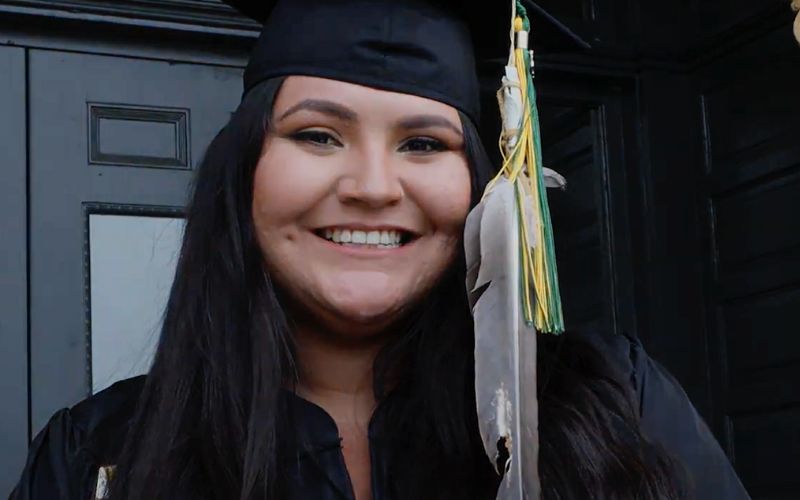
- Details
- By Neely Bardwell
A bill protecting the rights of Native American students in Michigan to wear regalia during graduation ceremonies has been sent to Governor Gretchen Whitmer’s desk.
HB4854, first introduced in the Michigan House of Representatives in July 2023 enshrines the rights of American Indian and Alaska Native children in grades K-12 to wear culturally and spiritually significant pieces of regalia during graduation and other school ceremonies. It passed the House on December 13, then passed the Senate on December 20.
The Anishinaabek Caucus of the Michigan Democratic Party and Michigan Education Justice Coalition were instrumental in the bill’s passage. Caucus Secretary Julie Dye (Pokagon Band of Potawatomi) told Native News Online it is only the beginning of the fight to make Native voices heard and communities visible.
“I drafted the bill language from what had been enacted in other states, because I heard so many accounts of different schools in Michigan that had been denying Native children their access to graduation ceremonies wearing regalia,” Dye explained. “The education institutions have a long-standing history of abuse toward our people, and this is just one of those.”
HB4854 is originally part of a seven-bill package called the Michigan Indigenous Culture and Heritage Package. Another bill from the package is HB4825, which passed in December 2023 and protects Manoomin, or wild rice, a staple sustenance to regional tribes. Another bill changed the milkweed plant from being labeled a “noxious weed,” as it is the only plant in which monarch butterflies, an endangered species, can lay their eggs.
Dye explained that the Caucus engaged in educating congress members to get the bills passed. Some congress members, she said, brought up the question of weapons, even suggesting an eagle feather, a sacred object to Native communities, could be used as a weapon.
“For Native students, wearing regalia, it's a sense of pride, and it's a sense of being proud of who they are, where they came from, a reclaiming of their culture and all that goes along with that. It's the ability to express themselves daily without having to hide like we've always had to do because people don't understand the culture,” Dye said.
With Republicans set to take control of the house this month, Dye says that the work to educate lawmakers on Native issues remains the same.
“I think the challenge will be to not politicize everything because no matter what you do, or what you say, or who you speak with, for some reason, it turns into a political debate. A lot of these long-standing injustices with our people have never been addressed. If we can get people to sit down and explain and educate them, have them listen to us, that's the first step, no matter what party they are.”
More Stories Like This
Committee Advances 20% Increase to Navajo Child Support GuidelinesNavajo Committee Advances $84M Transportation Improvement Plan
NCAI Passes Two Emergency Resolutions on Immigration Enforcement Activities
Chickasaw Lighthorse Police Officer named Indian Country Law Enforcement Officer of the Year
Indian Gaming Association Rallies Broad Coalition Against Sports Event Contracts It Calls Illegal Threat to Tribal Sovereignty
Help us defend tribal sovereignty.
At Native News Online, our mission is rooted in telling the stories that strengthen sovereignty and uplift Indigenous voices — not just at year’s end, but every single day.
Because of your generosity last year, we were able to keep our reporters on the ground in tribal communities, at national gatherings and in the halls of Congress — covering the issues that matter most to Indian Country: sovereignty, culture, education, health and economic opportunity.
That support sustained us through a tough year in 2025. Now, as we look to the year ahead, we need your help right now to ensure warrior journalism remains strong — reporting that defends tribal sovereignty, amplifies Native truth, and holds power accountable.
 The stakes couldn't be higher. Your support keeps Native voices heard, Native stories told and Native sovereignty defended.
The stakes couldn't be higher. Your support keeps Native voices heard, Native stories told and Native sovereignty defended.
Stand with Warrior Journalism today.
Levi Rickert (Potawatomi), Editor & Publisher


